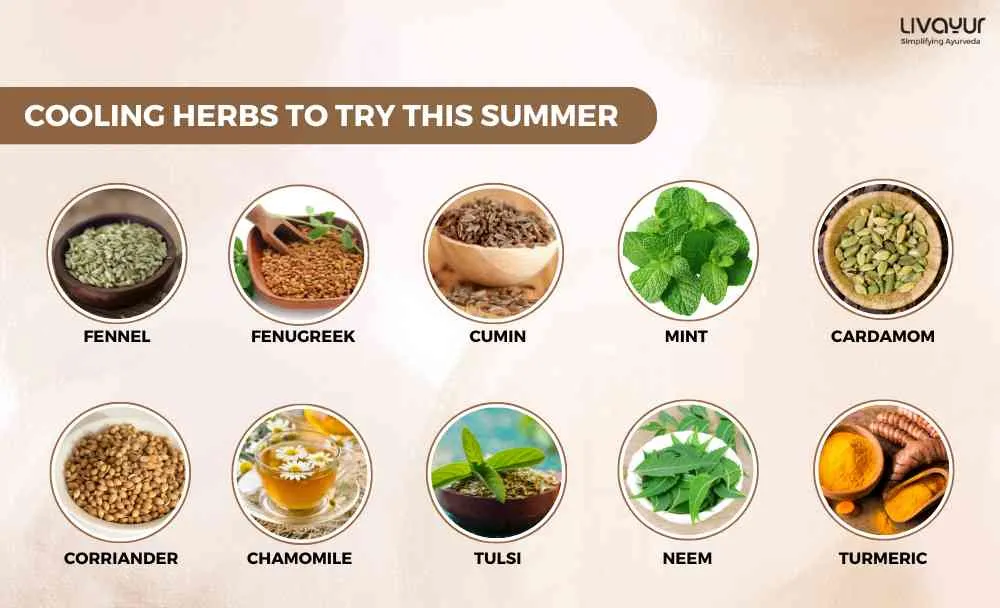
As summer approaches, the sweltering heat brings with it a constant need to keep the body cool and consume heat-reducing food. Staying hydrated is essential, as excessive heat can lead to inflammation, acne, and discomfort such as burning sensations in the chest. Including foods that are cooling for the body in diet such as herbs and spices is an effective way to combat summer heat. Herbs and spices act as natural coolants, they not only aid in digestion but also help lower body temperature. Ayurveda advocates for the use of spices and herbs, as they not only enhance the flavor of food but also offer a balancing effect on physiology.
In this article, we’ll learn about 10 herbs that have a cooling effect on the body and provide relief from the summer heat.
- Fennel Seeds
In addition to being an excellent source of vitamin C, fennel seeds can aid in lowering heat-related inflammation in the body. Fennel seeds also help the body fight against heartburn and indigestion, prevent acidity and stimulate the digestive juices.
- Fenugreek Seeds
Fenugreek seeds are great for reducing blisters, nausea, rashes and discomfort usually caused by heat. These seeds can help lower body temperature and act as a coolant. In addition, fenugreek seeds can help treat intestinal problems such as diarrhea and bloating.
- Cumin Seeds
Cumin is one of the most common spices in Indian cuisine and has many health benefits. Regular consumption of cumin seeds helps the body detoxify and eliminate problems caused by acidity and gas. These seeds also provide relief from indigestion or bloating.
- Mint
Mint is a popular herb known for its cooling sensation and is often a great summer drink infused with water and consumed. It is full of menthol, which can treat chest pains and indigestion. It dissipates the excess energy released by the digestive process, opening and activating the skin pores, which calms aggravated pitta.
- Cardamom
Cardamom is a spicy culinary spice often used in traditional Indian cooking. The consumption of cardamom lowers the concentration of triglycerides in people, which can cause some cardiovascular diseases by exceeding a certain limit. Thus, cardamom has an indirect role in improving the symptoms of metabolic disorders. It is also known as “tridoshic” because it balances all three energies in the body. It fights against unnecessary stomach acids. Ground cardamom seeds also help treat stomach cramps.
- Coriander Seeds
Coriander seeds can help keep the digestive tract clean and also prevent inflammation, which is a major concern during summer. Thanks to its ability to lower body temperature, it helps keep the body cool. These seeds are a good source of antioxidants and contain fiber, which helps the liver function better by increasing the production of digestive hormones.
- Chamomile
Known as Babunah in Ayurveda, chamomile is known for its calming and digestive properties. As an anti-inflammatory and digestive aid, chamomile can help relieve some symptoms of excess pitta, such as inflammation and heartburn.
- Tulsi
The scorching heat of summer and exposure to the sun, along with dust and pollution, can leave the skin tanned, scarred and irritated. Due to its healing, antibacterial, antifungal and anti-inflammatory properties, Tulsi is beneficial for the skin, preventing skin irritations and acne and relieving skin infections. Rich in vitamin K and antioxidants and rich in vitamins, minerals, electrolytes and phytonutrients, Tulsi is the most important ingredient for healthy hair and skin, especially in summer.
- Neem
The summer heat brings with it various skin problems. Excessive heat and sweating aggravate existing skin diseases and worsen acne breakouts. Due to its anti-inflammatory properties, neem can relieve irritation and redness and is often recommended by experts for skin problems. The carotenoid and vitamin E content in Neem helps reduce acne scars, dark spots, blemishes and hyperpigmentation.
- Turmeric
With its curcumin content, turmeric has antimicrobial and anti-inflammatory properties that help heal acne scars and fight bacterial infections. In addition, turmeric helps to calm the skin and even out the skin tone, making the skin naturally soft, supple and radiant.
References:
- https://my.clevelandclinic.org/health/articles/11117-triglycerides
- https://www.researchgate.net/publication/236879895_Nutritional_and_medicinal_aspects_of_coriander_Coriandrum_sativum_L_A_review
- https://www.ncbi.nlm.nih.gov/pmc/articles/PMC2995283/
- https://www.researchgate.net/publication/336134806_Lemongrass_a_review_on_its_botany_properties_applications_and_active_components
- https://www.ncbi.nlm.nih.gov/pmc/articles/PMC4296439/#:~:text=These%20studies%20reveal%20that%20tulsi,%2C%20chemopreventive%2C%20radioprotective%2C%20hepato%2D
- https://www.ncbi.nlm.nih.gov/pmc/articles/PMC7522354/
















